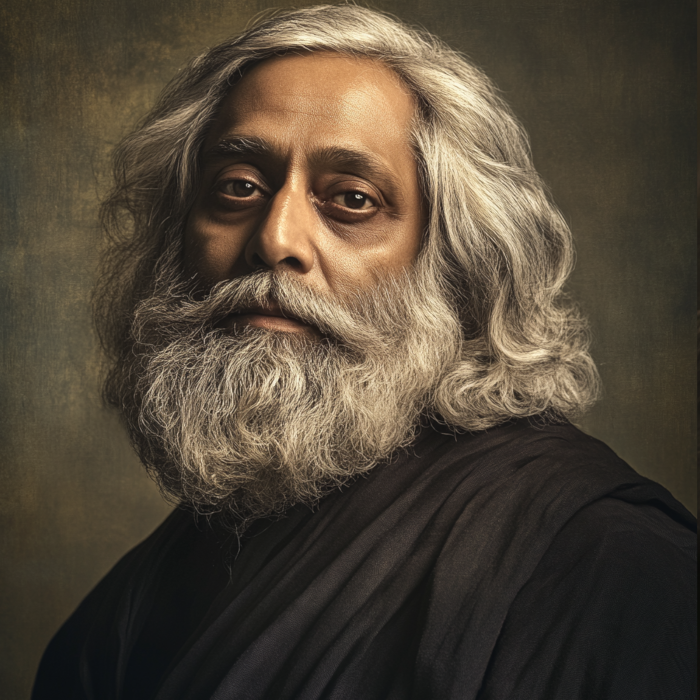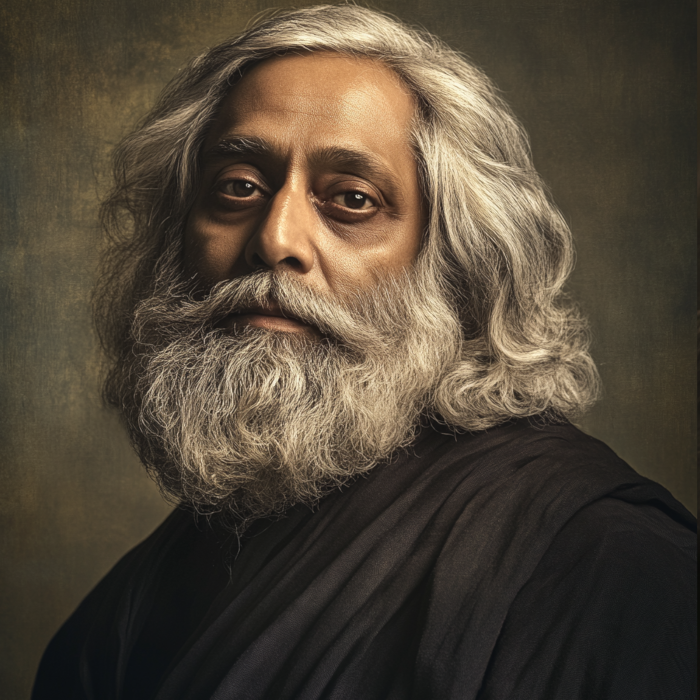


Rabindranath Tagore (1861–1941) was a towering figure in Indian literature, music, and art, and he is widely regarded as one of the most important cultural figures of the late 19th and early 20th centuries. He was a poet, philosopher, playwright, composer, and painter, whose work reshaped Bengali literature and music, as well as Indian art. Tagore was the first non-European to win the Nobel Prize in Literature in 1913, and his influence extended far beyond the borders of India.
Birth: Rabindranath Tagore was born on May 7, 1861, in the Jorasanko Thakur Bari in Calcutta (now Kolkata), India, into a prominent Bengali family. His father, Debendranath Tagore, was a leader of the Brahmo Samaj, a religious and social reform movement, and his mother, Sarada Devi, was a deeply religious woman. Tagore was the youngest of thirteen children.
Education: Tagore's early education was unconventional. He was primarily home-schooled by tutors and exposed to a wide range of subjects, including literature, music, art, and science. He began writing poetry at an early age. In 1878, Tagore traveled to England to study law, but he left school before completing his degree and returned to India to pursue his literary and artistic interests.
Poetry and Prose: Tagore's literary output was immense, spanning more than 2,000 songs, thousands of poems, over 30 volumes of short stories and novels, and numerous plays and essays. His work is characterized by its lyrical beauty, deep philosophical insights, and profound humanism. Tagore wrote primarily in Bengali, but he also translated many of his works into English, which brought him international recognition.
Gitanjali: One of Tagore's most famous works is Gitanjali (Song Offerings), a collection of poems that he translated into English. This work earned him the Nobel Prize in Literature in 1913. Gitanjali is celebrated for its spiritual depth and lyrical quality, expressing a deep connection with the divine and the beauty of the natural world.
Short Stories and Novels: Tagore was also a master of the short story. His stories often explored complex human emotions and social issues, reflecting the changing society of Bengal. Some of his most famous short stories include "Kabuliwala," "The Postmaster," and "The Hungry Stones." His novels, such as Gora, Ghare Baire (The Home and the World), and Chokher Bali, explore themes of identity, nationalism, and the role of women in society.
Plays and Dramas: Tagore's plays combined elements of traditional Indian theater with modern themes and were known for their lyrical dialogue and exploration of philosophical ideas. Notable plays include Dak Ghar (The Post Office), Raktakarabi (Red Oleanders), and Chitrangada.
Rabindra Sangeet: Tagore was also an accomplished composer and musician. He created a genre of music known as Rabindra Sangeet, which consists of more than 2,000 songs that blend classical Indian music with folk traditions. His songs remain immensely popular in Bengal and are an integral part of Bengali culture. Two of his compositions, "Jana Gana Mana" and "Amar Shonar Bangla," became the national anthems of India and Bangladesh, respectively.
Painting: In his later years, Tagore also took up painting and became a prolific visual artist. His art, characterized by bold strokes and innovative use of color, was highly experimental and drew on both Indian and Western influences. Tagore's artwork was exhibited in galleries in Europe, the United States, and Asia, adding another dimension to his already diverse creative legacy.
Philosophy: Tagore's philosophical views were deeply influenced by the Upanishads, and his work often reflects a synthesis of Eastern and Western thought. He believed in the unity of all life and emphasized the importance of spiritual freedom and harmony with nature. Tagore was critical of nationalism, viewing it as a divisive force, and he advocated for a more universal humanism.
Educational Reforms: Tagore was a visionary educator who sought to reform the rigid and colonial education system in India. In 1901, he founded the experimental school at Santiniketan (later to become Visva-Bharati University), where education was based on the principles of freedom, creativity, and respect for nature. The school emphasized learning through experience and the arts, and it attracted students and scholars from around the world.
Nationalism and Independence Movement: Although Tagore supported India's struggle for independence, he was critical of the narrow nationalism that he believed could lead to conflict and division. His views on nationalism were complex; while he opposed British colonial rule, he also warned against the dangers of extreme nationalism. His novel Ghare Baire (The Home and the World) explores these themes in depth.
Rejection of Knighthood: In 1919, Tagore was knighted by the British government, but he renounced the title later that year in protest against the Jallianwala Bagh massacre, in which British troops killed hundreds of unarmed Indian protesters. This act was a powerful statement of his commitment to justice and his opposition to colonial oppression.
Global Recognition: Tagore's work transcended national boundaries and was celebrated internationally. He traveled extensively, giving lectures and sharing his ideas on literature, education, and philosophy. He had a profound influence on figures like W.B. Yeats, Ezra Pound, and Albert Einstein, with whom he engaged in intellectual dialogue.
Cultural Impact: In India, Tagore is revered as a national treasure. His contributions to literature, music, and art have left an indelible mark on Indian culture. His ideas on education and humanism continue to inspire educators and thinkers.
Literary and Artistic Influence: Tagore's influence extends beyond literature and art; his ideas have shaped modern Indian thought and continue to inspire movements for social and cultural reform. His blending of Eastern and Western traditions helped bridge cultural divides and opened new avenues for cross-cultural understanding.
Nobel Prize: Tagore was the first non-European to win the Nobel Prize in Literature, a recognition that brought Indian literature to the global stage and highlighted the richness of Bengali culture. His Nobel acceptance made him an international literary figure and established him as a leading voice in world literature.
Death: Rabindranath Tagore passed away on August 7, 1941, at the age of 80, in his ancestral home in Kolkata. His death was widely mourned, and his legacy continues to be celebrated.
Commemoration: Tagore's contributions are commemorated through various institutions and cultural festivals. His birthday, known as Rabindra Jayanti, is celebrated with great enthusiasm in Bengal and other parts of India, featuring performances of his music, recitations of his poetry, and exhibitions of his art.
Rabindranath Tagore remains a symbol of India's cultural renaissance and intellectual heritage. His work continues to inspire generations of writers, artists, and thinkers, both in India and around the world. Tagore's vision of a world united by creativity, empathy, and mutual respect remains as relevant today as it was during his lifetime.

We use cookies
We use cookies and other tracking technologies to improve your browsing experience on our website, to show you personalized content and targeted ads, to analyze our website traffic, and to understand where our visitors are coming from. Privacy Policy.